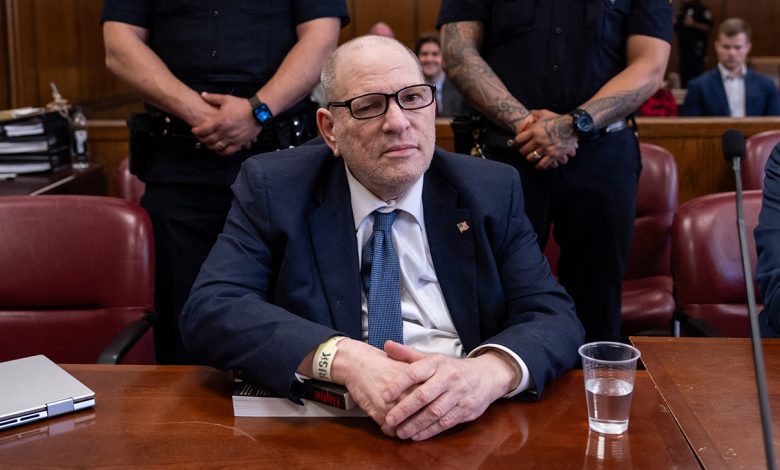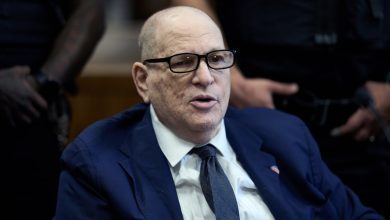Harvey Weinstein’s Life Behind Bars: “He’s Still Running Sh**” (Exclusive)

Over the past many months, the press has fussed over Harvey Weinstein‘s symptoms more obsessively than his doctors, reporting on an ever-worsening medical chart showing spinal stenosis and diabetes, faltering kidneys and vision, lost teeth, through-the-roof thyroid numbers, and the long-term leukemia that the disgraced studio head had long kept secret. Still in regular contact with his two now-teenagers by his fashion designer ex-wife, Georgina Chapman, Weinstein had wanted to shield them from the knowledge of his cancer.
The man just keeps on keeping on, back in Manhattan this week to possibly thwart more expectations — he hopes with an acquittal. A year ago, he was trundled into this same courtroom after his 2020 conviction for sex crimes against then-production assistant Miriam Haley and aspiring actress Jessica Mann capsized in New York State’s Court of Appeals. He looked every bit a wizened Salieri in his wheelchair, hair wispy as a toddler’s, those meaty prizefighter fists now frail, flaccid flippers (one always shackled to the arm of the chair, as per protocol). A price tag was visible on a new, slimmer-fitting court-going blazer (given all the muscle mass lost in the slammer), his blue tie loose, a white dress shirt horse-collary underneath. Here was a 72-year-old man going on 80 and feeling the hot breath of death at the back of the neck. That September, a published report by the Associated Press announcing three previously uncharged sex crimes then being marched past a grand jury spurred a heart attack just two days later, immediately followed by emergency surgery.
His reps frequently wondered whether Weinstein would ever make it to his own retrial, on what would wind up being just a single new charge. They openly accused the State of New York of “trying to kill him” out there at Rikers Island jail with crummy care, forcing brutally quick turnarounds on his increasingly regular Bellevue Hospital runs. Weinstein often looked haggard and out of it — unshaven, mouth ajar, eyes bleary. But even when everyone knew his health was at its lowest, and his wheelchair would nudge through the side door of the courtroom signaling his arrival, those battered black sneakers of his would break into a shambling run as he was rolled in — as if to sprint into court, establish his resolve.
By the time he was back in court for a pretrial hearing on Jan. 29 of this year, Weinstein had finally had it. Perhaps he could bully (or guilt) Judge Curtis J. Farber into allowing People vs. Harvey Weinstein to cut in line ahead of a homicide trial on Farber’s calendar. It was terrific theater, his only leverage in these negotiations his own demise.
“You’re picking a jury today? So that’s something set in stone?” began Weinstein’s interrogation of the judge in that Bluto voice that hadn’t been heard publicly in years — except to utter the words not guilty.
“Can we start this April 7? Every week counts. Please do that, your honor.”
Weinstein speaks!
He was alleging that at 5 a.m. that very morning, Rikers staff handed him the wrong pills. He said he often found himself gasping for air. His being treated this way was outrageous, he felt, given his current revised status as “an innocent man,” in his phrasing — that 2022 sex-crime conviction in Los Angeles on that one woman there (dumping 16 more years over New York’s now-canceled 23) not really top of mind.
Weinstein was in bad shape. Rikers, too: A “hellhole.” A “medieval situation,” he called it. He was not sure he could hang on.
“I won’t be there for April,” he said grimly.
Yet here we are, with opening arguments in this do-over expected to kick off this week, a court order confining him in Bellevue for the duration of the trial. When prosecutors at his hearings referred to complaining women as “survivors,” Harvey’s lead trial attorney Arthur Aidala would object profusely: “Referring to certain individuals as survivors is a conclusionary term.” No, it was his client who was the survivor here.
***
Weinstein abides, however tremulously, thanks to a devoted support staff. Innumerable hours are expended on his behalf (and not pro bono, insists his longtime press rep Juda Engelmayer, pointing to royalties still rolling in from his films). These relationships are almost entirely telephonic, but then, Weinstein has stressed pretty much from day one that he doesn’t want visitors. “He doesn’t need the face to face,” says one of his lawyers. Prison policy keeps him chained to his walker when he is out of his cell, and the resultant instability as he squeaks his way to the visitation room feels perilous. Gives him agita. The 20-something actress-girlfriend he met before prison remains a confidante, but she split some time ago to Malibu. His SUNY Buffalo college roommate, retired pediatrician Bill Currao, visited him at his two prisons upstate as did his children by Chapman, who “still cares about him when it comes to the kids,” says someone close to the family.
But the person who speaks to Weinstein most often has never been out to Rikers to see Weinstein: Prison consultant Craig Rothfeld of Inside Outside Ltd. Rothfeld — a sentencing expert who also now represents alleged United Healthcare CEO killer Luigi Mangione — has emerged as the leading go-to guy in the New York City and State systems, the chief lobbyist for white-collars who find themselves tossed behind bars like Trump accountant Allen Weisselberg. Rothfeld imparts the unwritten rules of play, like how to handle the stressor situations that could get one shivved, such as queues to use the phone and dominance over the TV set in the day room. He helps set up the commissary accounts. These accounts are a known barter mechanism by which prisoners can get additional food or phone time, even if Weinstein has been entirely isolated from other prisoners since being taken off suicide watch in 2020. Craig Rothfeld is Weinstein’s business liaison and health care representative, a facilitator to Weinstein’s legal team and conduit to his children and the world at large.
A boyish, bearded presence who counsels more than 100 clients at any given time, Rothfeld explains that Rikers forbids any inmate classified a “Centrally Monitored Case” to walk the prison freely without being cuffed.
Thanks to that solitary California sex-crime conviction, Weinstein remains restricted thusly, having committed what state policy deems a “large-scale crime that captures the public’s attention, e.g. … sex crimes.” (One might consider it overkill, too, when 16 law enforcement officers crowd into a modest-size Manhattan courtroom for Weinstein’s second arraignment as if this guy in a wheelchair is any threat — unless you buy the line that they’re more worried about what some spectator might try to do to Weinstein.)
In transit, Weinstein resignedly submits to the ankle shackle yet has never found himself yoked to another prisoner in any van, as is usually the case. He must always be transported alone — which explains his complaints about being left around like a sack of potatoes; a couple weeks ago he languished for eight solid hours in the wheelchair in a downstairs cell at the courthouse as he awaited his designated driver. The never-ending hurry-up-and-waits are why he’s always got a couple weighty tomes stacked in his lap, his taste running from big-cheese biographies (of Elia Kazan and Abraham Lincoln, among others) to best-sellers, including Conclave. It’s less about impressing the press that all cylinders are firing upstairs than his need to keep occupied. Transit is one of the most humiliating, exhausting and disorienting experiences for prisoners; Weinstein was flown on a state-owned medical plane in 2021 to face his charges in Los Angeles, hardly some slick private jet as some outlets reported, says Rothfeld: “He’s still in shackles. He’s still a prisoner. It’s not the way you want to travel.”
Rothfeld is a onetime Rikers inmate himself, convicted in 2015 for defrauding investors and falsifying business records: “I did the wrong thing. I got punished for it. And that’s not anyone else’s fault,” he says.
Hired immediately upon Weinstein’s 2020 conviction, Rothfeld guesses he’s spoken with Weinstein perhaps 6,000 times by phone, checking in on him in person only at sporadic court dates or at Bellevue Hospital’s prison wing, “perhaps two or three times ever.” Then there was a single week, too, at Weinstein’s trial in Los Angeles, come to think of it. Weinstein is on the phone to him three or four times a day. Just like any other inmate at Rikers, Weinstein is allocated 21 minutes of phone time for every three hours he spends in captivity, a 15-minute call and a six-minute call, from 7 in the morning until 11 at night.
“We talk about politics, what’s going on in Israel. What’s going on in the world,” Rothfeld continues. “Books he’s reading. I think getting his mind off his situation helps him.”
Given his formerly hyper-extroverted existence, Weinstein has had to adjust to an unnaturally hermitic isolation. He was kept in protective custody at Rikers, meaning, he spent 23 hours a day in his own room in the institution’s former infectious-diseases wing. Rikers authorities say Weinstein’s enforced isolation is a security measure, meant to protect their famous ward from violent prisoners seeking their own 15 minutes. But this is no medical ward here, and no remote-control levitating mattress, a decision made by the city Department of Corrections that rankles his defenders. “Optics is a huge part of it,” says Rothfeld. “The District Attorney can’t have anyone seen as getting special treatment.”
Weinstein’s infirmities have made it difficult for him to visit the yard — not that he is allowed to interact with anyone other than doctors and corrections officers. And given how short-staffed the prison has been of late, getting yard time is difficult for everyone.
He’s almost never exposed to another inmate, Rothfeld reiterates. It’s a lonesome existence. If not for that California conviction, “he would probably be on home confinement with an ankle bracelet, seeing his doctors whenever he wants,” says Rothfeld. He remains estranged from some of his children and his younger brother and former co-CEO, Bob. Last February, Harvey filed suit against Bob, claiming that he had quietly leeched money out of The Weinstein Co. in the run-up to the studio going off a cliff in 2017, and also incited Harvey to over-leverage himself as guarantor on a $45 million loan. Through his counsel Brian Kohn at Cyrulnik Fattaruso LLP, Bob Weinstein says, “Harvey’s claims are a work of fiction, and we look forward to demonstrating their complete lack of merit in court.”
Harvey did not go outside once the entire time he was off dealing with his Los Angeles sex crime charges — which was almost two years. “That’s cruel,” Rothfeld continues. Were he to beat the rap in Manhattan, that 16-year sentence he picked up in California would not reflect any time he already served in Manhattan, being consecutive and not concurrent. (This by order of the California judge, who indeed had a choice in the matter.)
“A dick move,” Engelmayer calls it, hotly anticipating the results of that appeal.
Weinstein’s two upstate correctional facilities — Wende and, after the L.A. trial, Mohawk — had issued him a tablet (a luxury absent from L.A. County jail). State prison inmates are now furnished with email-and-phone-capable Securus Unity tablets. Access to email has changed the way inmates do time, but the tablets at Rikers, which is overseen by New York City, omit email and phone privileges.
Harvey was able to keep up with the newspapers on his Rikers tablet but doesn’t have one at Bellevue. It has become very difficult to have physical newspapers brought into jails, “but whatever magazines are permitted, he gets,” says Engelmayer, who adds Weinstein keeps up with the Hollywood trades to the extent that he can. That said, his information is often a week behind: “He’ll be talking to me, and I’ll go, ‘Yeah, that issue is no longer an issue.’”
At both his upstate prisons and at Rikers, there are day rooms equipped with a television Weinstein could only access alone, depending on the whims of his guards, who control the clicker. They kick people out so he can have the room, and he’ll watch the news or Entertainment Tonight. He’s never there long enough to catch a full-length movie.
People buy Weinstein books via Amazon; he receives about two or three a week. He still has “notes meetings,” only now he’s giving notes on multiple drafts of legal papers instead of scripts. He is heavily involved in the minutiae of his defense, his lawyers say. Still, his cell isn’t crammed with the seemingly innumerable actions filed against him (and by him). “If there’s a dorm search or a cell search and somebody takes those papers, then they are out for public consumption,” says Rothfeld, so inmates shred those documents into garbage pails with their hands or send them back out with the lawyers. And every facility has its different persnickety rules governing snail mail, the letters restricted to a few pages. When Weinstein was upstate, I had a raft of mail returned to sender because I’d written “P. Eaton” as opposed to my full proper name in every return address field. The prisons demand to know who their charges are trafficking with.
Contrary to speculation, Weinstein has not participated in any prison-run sex-offender therapy programs. Usually the people required to take part in those programs don’t do so until they’re much closer to their release date, says Rothfeld.
Jennifer Bonjean is an attorney who has repped R. Kelly and won Bill Cosby his release on appeal. Also handling Weinstein’s California appeal, Bonjean is newly on deck to cross-examine Miriam Haley here at the Manhattan retrial. She finds Weinstein a bright, to-the-point person. Charming? Not so much. “Authentic,” she allows.
“It’s a hard time, being in Rikers,” says Bonjean, the words NOT GUILTY tattooed across her right shoulder. “You know, they say either the time is doing you or you are doing the time. Harvey is doing the time. But it still feels like he’s running shit from behind bars. Still maintaining relationships.”
Bonjean had tried to visit Harvey in L.A. but was denied access. “When I went to see him at Bellevue, he’s like, ‘Can you bring me David Mamet’s new book?’” A tidbit she presents without comment.
***
The legendarily left-leaning dethroned studio chief has lately been taken up by the right, going way beyond Weinstein’s baseline engagement of attorney Aidala, CNN’s harshest critic of D.A. Alvin Bragg’s Donald Trump hush-money prosecution and the very same lawyer who weeks ago secured zero jail time for Steve Bannon. Literally just down the hallway.
Conservative provocateuse Candace Owens is doing dramatic readings of transcripts from Weinstein’s first trial for her podcast’s 4 million listeners. Joe Rogan, on his podcast, is saying he can’t believe he’s on Harvey Weinstein’s side, weirdly reducing the accusations to generational differences about courtship. Calling Weinstein a guy “in the wrong place at the wrong time.”
Never a Trump fan (Hollywood’s onetime maestro marketer told people he worried Trump could win when all that Butler, Pennsylvania, fight-fight-fight imagery hit the media), Weinstein is suddenly the unlikeliest poster prisoner for what Trump is calling “the weaponization of prosecutorial power.”
The late-breaking, admiring attention is bucking Weinstein’s spirits. As his retrial gets going, he’s back to phoning in items about himself to gossip columns at TMZ.com, the Daily Mail, the New York Post. (“There’s been an awakening on social media,” Engelmayer explains. “They are more open to Harvey.”) Criticized by the newspapers recently for cracking a smile, Weinstein looked like he was trying his damndest to suppress any merriment when points were scored in a final court hearing before the buzzer. He’d regained 25 pounds, his neck again looking like a bison’s in some supernatural surprise glow-up, his press rep Engelmayer insisting he’s actually on a downhill trajectory especially given a current tongue infection that has him restored to Bellevue now for the trial. Weinstein finally filed suit the opening day of his trial against seemingly the entire state prison system — including Bellevue — over the allegedly harrowing conditions in which he’d been kept, risking the anger of the very people he needs to care for him.
Rothfeld, the prison consultant, advises all his jail-bound clients to read Man’s Search for Meaning by Viktor Frankl, a psychiatrist-philosopher who found himself imprisoned in Auschwitz and was able to observe firsthand who survived that (admittedly worse) hellhole. Rothfeld claims he’s not sure whether Harvey has read the book, citing client confidentiality over and over. Frankl was convinced the way a person imagines his or her future seems to affect longevity. So how does Harvey Weinstein visualize his future?
Not in the movie business.
“I want justice for myself,” Harvey was telling the judge in January, showing some fight-fight-fight.
It can’t have been easy hearing Georgina Chapman’s boyfriend, actor Adrien Brody, shout out to Weinstein’s kids when Brody claimed his Oscar last month, calling himself their “Popsy.”
“I think he imagines being free,” says Rothfeld. “Spending time with his family, making the connections lasting and more meaningful.”
“He wants his children to know he’s not a bad guy,” says Engelmeyer, “and that he loved film and was an innovator and an art-maker.”
“It might be a pipe dream to reclaim any of your reputation. Any of your legacy. Those things are going to be very hard to regain,” adds attorney Bonjean. “I don’t think Harvey thinks of himself staying there in Rikers. He shouldn’t die there. It’s frightening, the prospect of it. But he’s fighting like hell.”
Source: Hollywoodreporter
HiCelebNews online magazine publishes interesting content every day in the celebrity section of the entertainment category. Follow us to read the latest news.
Related Posts
- Where and When to Stream ‘Vanderpump Villa’ Season 2 Online
- Kevin Hart to Host 2025 BET Awards
- Hugh Jackman and King Princess Duet Sonny and Cher’s ‘I Got You Babe’ at Radio City in N.Y.C. — Watch!
- On the Set of Seth Rogen’s ‘The Studio’ as a “Oner” Comes to Life: “It Creates a Feeling of Stress”
- Star Wars Celebration: Lucasfilm Unveils ‘Light & Magic’ Season 2 Trailer





